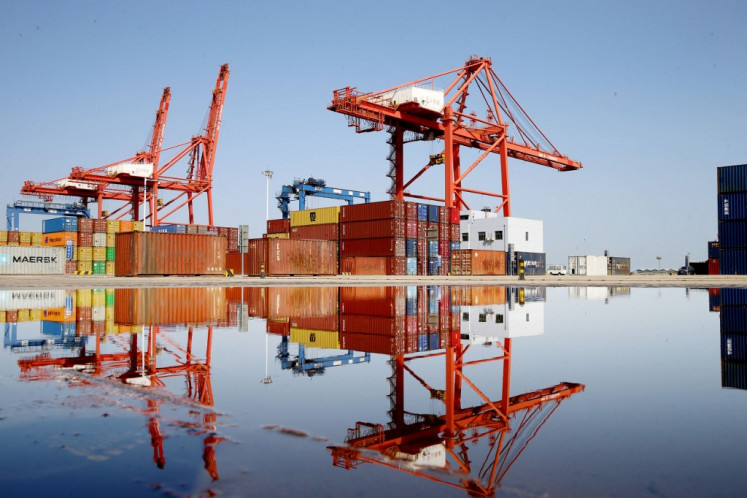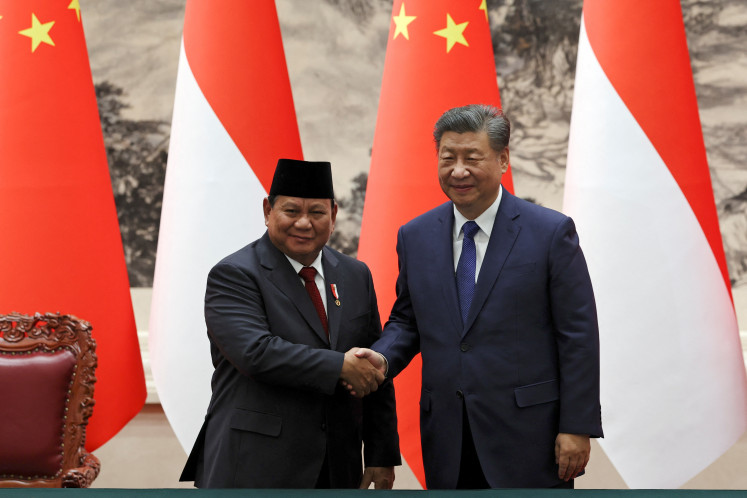Popular Reads
Top Results
Can't find what you're looking for?
View all search resultsPopular Reads
Top Results
Can't find what you're looking for?
View all search resultsASEAN under Bangkok: Chance for regional prosperity
Few regions have experienced as many consecutive years of sustained economic growth as Southeast Asia. And with an average annual gross domestic product (GDP) approaching 5 percent, the economy of the ASEAN Community is expanding more than twice as fast as some other parts of the world.
Change text size
Gift Premium Articles
to Anyone
F
ew regions have experienced as many consecutive years of sustained economic growth as Southeast Asia. And with an average annual gross domestic product (GDP) approaching 5 percent, the economy of the ASEAN Community is expanding more than twice as fast as some other parts of the world. This prosperity has been stimulated by ever deepening economic, political security and socio-cultural cooperation of countries in the region.
As Thailand has assumed the chairmanship of ASEAN this year under the theme “Advancing Partnership for Sustainability”, it is time to reflect on how this positive path forward can be continued and safeguarded. But some uncomfortable truths have to be acknowledged to succeed in these efforts.
In parallel with the impressive economic progress of the region, transnational organized crime networks have ingeniously taken advantage of reductions in trade barriers and investments in infrastructure, as well as corresponding increases in cross-border movements of people, goods and capital.
According to recent estimates of the United Nations Office on Drugs and Crime (UNODC), transnational organized crime in the region has been conservatively valued at US$100 billion per year — a value larger than the GDP of several ASEAN member states.
One of the most dramatic transnational crime challenges faced by the ASEAN Community is that of illicit drugs.
In fact, 2018 was yet another record year for the regional drug market as it continued to shift from opium and heroin toward synthetic drugs and methamphetamine. Southeast Asia’s drug business is also now impacting well beyond the immediate region as the “Golden Triangle” has emerged as the main source of supply for surrounding regions and countries including Australia, China, Japan, the Republic of Korea and New Zealand — all strategic partners for ASEAN.
Other transnational crimes that continue to confront the region include trafficking in persons, the illicit trade in wildlife and timber, and challenges to cybersecurity.
In some contexts, the crime groups controlling these “industries” pose a real threat to the rule of law and stability.
This is particularly true of countries that lack adequate resources to respond, although efforts are being undertaken to augment capacities. Worryingly the challenge is not confined, and we know that trafficking networks involved stretch across the region and even as far as North America.
This reality has led ASEAN to seek transnational countermeasures and cooperation with international partners.
The annual senior officials meetings and ministers’ meetings on transnational crime and the annual meetings on drug issues are fora where ASEAN and partners like the UNODC consider and discuss data, policies and plans to respond non-traditional security challenges facing the region.
The Thai government recognizes the severity of the transnational organized crime challenge to the overall well-being of Southeast Asia, and has selected border management cooperation as a key political security priority for 2019.
Thailand intends to make sure that cross-border trade continues to expand in-line with the ambitious integration objectives outlined in the ASEAN Community Vision 2025, and that it happens securely.
Indeed, as the ASEAN region becomes increasingly integrated and connected, advances will have to be made in border management to safeguard the region.
Thailand, in partnership with ASEAN, will closely cooperate with its partner UNODC on this endeavor. For the past few years, Thailand and UNODC have convened annual border management conferences to consider ways to connect integration and security plans, and a ministerial conference planned for April 3 and 4, in Bangkok will provide final input to a road map for coming ASEAN discussions, ministerial meetings and late year summit.
UNODC generates unique information through its research on transnational organized crime, designs and supports practical mechanisms to improve crossborder cooperation such as border liaison offices, and provides advice and training to law enforcement and justice officials and leaders — it is the right partner for this ASEAN effort.
Thailand, ASEAN and the UN firmly believe in the potential of the ASEAN Community. It is apparent that the continued success of the region will require a much closer alignment of economic and security agendas, and in practical terms this means improving border management standards and cooperation across the diverse ASEAN Community in the years to come.
Thailand stands ready to use its chairmanship to ensure ASEAN will continue to prosper and grow in a sustainable manner, and the UN is committed to support Thailand in this effort.
***
Jeremy Douglas is the regional representative of the United Nations Office on Drugs and Crime for Southeast Asia and the Pacific based in Bangkok. Suriya Chindawongse is the director-general of the Department of ASEAN Affairs of Thailand’s Ministry of Foreign Affairs.











